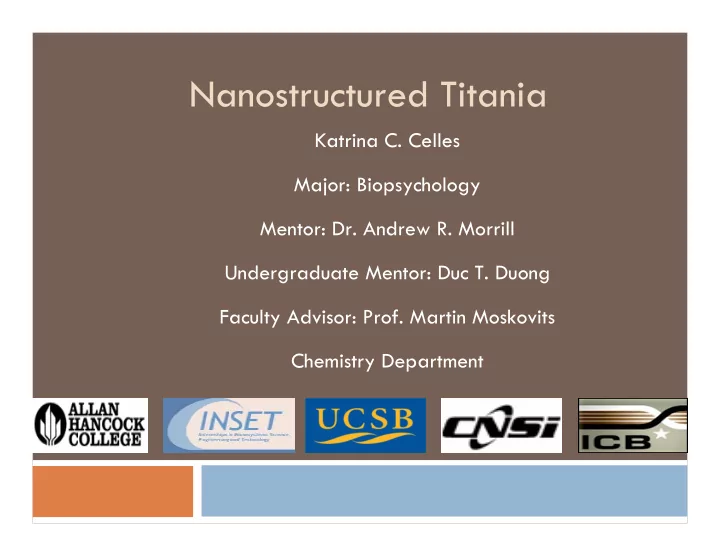

Nanostructured Titania Katrina C. Celles Major: Biopsychology Mentor: Dr. Andrew R. Morrill Undergraduate Mentor: Duc T. Duong Faculty Advisor: Prof. Martin Moskovits Chemistry Department
What is Nanostructured Titania? � Anatase TiO 2 � Metal Oxide with a diverse structure containing high surface area � Modified with silane and nanoparticles for variety of applications
Applications � Low Pressure Gas Sensing � Biomolecular detection � Vapor detection using Surface Enhanced Raman Spectroscopy (SERS) � Mass spectrometry
Goals of the Summer � Synthesize Nanostructured Titania (NST) substrate � Functionalize substrate with various organo silane molecules and colloidal nanoparticles � Characterize modified substrate via Scanning Electron Microscopy (SEM), Raman Spectroscopy, and Electrical Measurements
Synthesizing NST substrate � NST substrate consist of: Titanium (Ti) Silica (SiO 2 ) NST Silicon (Si) � Oxidized in 10% Hydrogen Peroxide at 80 o C Titania (TiO 2 ) Silica (SiO 2 ) NST Silicon (Si)
Functionalize with Organo Silane and Colloidal Nanoparticles 3-Aminopropyl triethoxy
Characterize modified NST substrate � Scanning Electron Microscopy (SEM)
Control Experiment NST treated with silane and Silver (Ag) nanoparticles NST not treated with silane, but treated with Silver (Ag) nanoparticles
SEM Images of NST with AuNP NST treated with silane and Gold (Au) nanoparticles NST not treated with silane, but treated with Gold (Au) nanoparticles
Applications for modified NST substrate � Surface-Enhanced Raman Spectroscopy
Applications for modified NST substrate � Raman effect silane
Applications for modified NST substrate � Raman effect NP NP = nanoparticle
Applications for modified NST substrate � Raman effect Linker/ Molecule of interest
Applications for modified NST substrate � Raman effect NP NP = nanoparticle
Applications for modified NST substrate � Raman effect � Formation of Raman active substrate � Applications in solution and airborne analyte detection
Applications for modified NST substrate � Electrical Measurements
Conclusion � Successfully synthesized NST substrate � Deposited silane and nanoparticles onto the NST substrate � Characterized samples using SEM
Future work � Obtain Raman spectrum for various linkers and metal nanoparticles � Fabricate contact pads for NST substrates � Perform electrical measurements
Acknowledgements Dr. Andrew R. Morrill Duc T. Duong Jodi Hong Moskovits’ Lab INSET Jens Dr. Nick
Recommend
More recommend